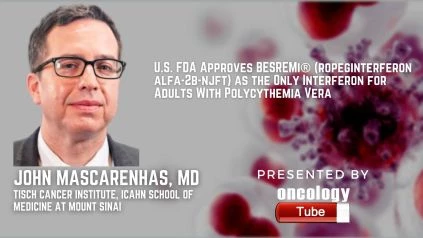John Mascarenhas, MD from the Tisch Cancer Institute, Icahn School of Medicine at Mount Sinai speaks about the U.S. FDA Approves BESREMi® (ropeginterferon alfa-2b-njft) as the Only Interferon for Adults With Polycythemia Vera.
The US Food and Drug Administration (FDA) has approved BESREMi® (ropeginterferon alfa-2b-njft) for the treatment of adults with polycythemia vera. PharmaEssentia Corporation, a global biopharmaceutical innovator based in Taiwan, is leveraging deep expertise and proven scientific principles to deliver new biologics in hematology and oncology (PV).
BESREMi is a novel monopegylated, long-acting interferon that has been shown to have cellular effects on polycythemia vera bone marrow. BESREMi was approved with a boxed warning for the risk of serious illnesses such as neuropsychiatric, autoimmune, ischemia, and infectious disorders. BESREMi will be accessible in the United States in the next weeks, according to PharmaEssentia.
PV is a rare, chronic, and life-threatening blood cancer caused by a mutation in bone marrow stem cells, which leads to an excess of blood cells. When this happens, a person is at risk for significant health issues such blood clots, strokes, and heart attacks. 2,3 A JAK2V617F mutation is responsible for the majority of cases2,3 and, if left untreated, this painful disease can develop to myelofibrosis and malignancies, including acute myeloid leukemia.
Safety data from the PEGINVERA and PROUD/ CONTINUATION-PV investigations, as well as efficacy data from the PEGINVERA clinical study program, were used to get FDA approval in the United States. After 7.5 years of BESREMi treatment, 61 percent of PV patients had a complete hematological response (defined as a hematocrit of 45 percent without phlebotomy for at least 2 months since last phlebotomy, platelets of 400 x 109/L, leukocytes of 10 x 109/L, and normal spleen size (longitudinal diameter of 12 cm for females and 13 cm for males). Importantly, 80% of patients had a positive hematological response (based on objective laboratory parameters only, with the exclusion of normal spleen size and thrombosis). These are the most often utilized metrics in therapeutic decision-making. 1 The most common adverse responses (incidence >40 percent) in the pooled safety group of patients treated with BESREMi were influenza-like sickness, arthralgia, tiredness, pruritis, nasopharyngitis, and musculoskeletal pain. Urinary tract infection, transient ischemia stroke, and depression were the most serious side responses (incidence > 4%).

